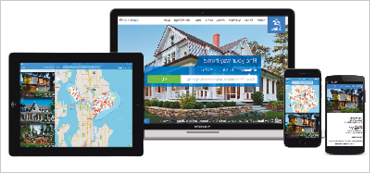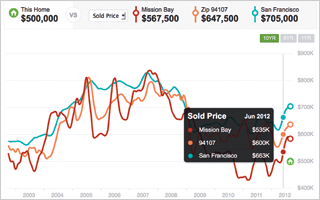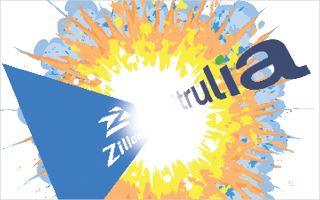Online real estate listing services continue to captivate the public, but REALTORS® have the final word.
By Donna Shryer
Kimye, Brangelina, Bennifer and now Zilia, the latest celebrity blending. The merger between Zillow, the most-trafficked real estate listing website, and its main competitor Trulia was finalized on February 17, when the FTC granted Zillow a green light to create the Zillow Group.
The union wrought two immediate results. First, the Zillow Group assumed top-dog as the dominant online real estate listings portal, accounting for nearly 48 percent of Web traffic for listings not including local website traffic. Secondly, the merger recharged an ongoing debate over the pros and cons surrounding consumer-centric real estate search capabilities and whether these sites affect REALTORS® businesses.
The general consensus among REALTORS®? Online real estate listing portals, no matter how big or numerous they become, wont significantly change existing market dynamics.
Property buyers, sellers, renters and curious homeowners will continue to rely on real estate database websites for home-related information, statistics and facts.
Real estate agents and brokers must acknowledge that these databases are useful starting points for consumers but stress that they can feature misleading information, out-of-date data and erroneous facts.
If Its on the Internet, It Must Be True
Theres no denying that online real estate listing portals impact the way consumers approach buying, selling, renting and assessing their homes value.

I read that 90 percent of home searches now start online, says Karrina Brown, CRS, broker associate with RE/MAX Executives in Springfield, Virginia.
In addition, online real estate portals add an element of fun to home shopping, says William True, CRS, broker/owner with Sarasota, Florida-based True Real Estate Inc. You enter a zip code and see home videos and photographs. No one asks if the photos are staged or the facts are true. Its a game.
Theres also the issue of Zillows Zestimates, which use an algorithm based on property assessments. While the Zillow Group calls their Zestimates reliable, True challenges this claim, adding that many consumers mistakenly confuse Zestimates with official real estate appraisals. Assessed value and market value are different things, True says. The assessor doesnt know if my basement floods. Without this information, a homes Zestimate could be inflated. Sure, the Zestimate is right there in print, but its misleading. Once the consumer realizes the truth and reduces the price often suggested by a respected agent the homes been on the market so long that everyone thinks its a dog.
Truth Be Told
In response to consumers unwavering faith in Internet content, brokers and agents have had to change their opinions of online real estate listing sites, stresses Julie Beall, CRS, broker owner of Julie Beall Inc. REALTORS® in Springboro, Ohio. Its where our buyers and sellers get their information. To stay on top of things, we have to routinely scope out these sites, so we know what our customers think they know especially if theyre relying on bad data, Beall adds.
A reputation for hyper-local insight brings referrals, which have gained greater importance since the advent of online real estate listing portals, says Lois Cox, CRS, sales agent with Berkshire Hathaway HomeServices Drysdale Properties, Pleasanton, California. Online listings dont have the specialized information I have. As my clients trusted real estate advisor, I protect my clients rights and their financial investment.

Online real estate listing portals affect the way consumers approach buying, selling, renting and assessing their home’s value.
Navigating Speed Bumps
No one disputes that the information superhighway provides useful real estate data, but the current system also presents speed bumps that skew the buying, selling and renting process, which can waste time and create false leads.
For example, theres real estate voyeurism, reports Quincy Virgilio, CRS, chairman of the board for MLSListings, and broker associate at Keller Williams Realty in Silicon Valley, California. Zillow reports 80 million visits per month, but only about 5 million homes are sold in the U.S. every year. If you go deeper, 70 percent of those 5 million homes are referral-based sales. Now youre looking at maybe 1.5 million homes sold from an online lead. So there is a lot of Internet activity, but the lead conversion rate remains small. Its just satisfying millions of peoples curiosity.
Its also the agents responsibility to explain right from the get-go that online real estate listing portals have limitations. These portals are a comprehensive data source, but the information is far more accurate for new condominiums vs. older homes, Brown says. You could have two homes built in the 1940s, one in great condition and the other needing $150,000 worth of work. Zillow, for example, has no way of knowing that, so both homes may have identical Zestimates.
Cox stresses, however, that online listing sites do help consumers come up with a short list of homes to view. When the client searches online for neighborhoods and homes that meet certain criteria, they can do their own drive-bys and decide if a home stays on the list or gets crossed off. When clients do their own preliminary search and viewing, this gives me time to do what I do best, which is to help my clients make a smart investment or complete a wise sale.
Find the listings and research data that your clients are looking at by visiting Zillow and Trulia.








